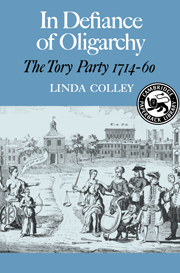1 - The Nature of the Challenge
Published online by Cambridge University Press: 03 February 2010
Summary
All's whiggery now,
But we old men are massed against the world.
W. B. Yeats, ‘The Seven Sages’, The Winding Stair and other Poems (1933), 23.Much greater ingenuity and a much higher imaginative endeavour have been brought into play upon the whigs, progressives and even revolutionaries of the past, than have been exercised upon the elucidation of tories and conservatives and reactionaries.
Herbert Butterfield, The Whig Interpretation of History (1931), 95.As an explanation of why those tories who were excluded from political power between 1715 and 1760 have been deprived of scholarly attention since Keith Feilingapos;s unsatisfactory 1938 study, The Second Tory Party, Yeats' poetry is more illuminating than Butterfield's prose. Chronicling mid-nineteenth-century British toryism is after all a growth industry. A historiographical world in which Michael Foot can take Lord Butler to task for impugning Benjamin Disraeli's integrity - and this under the title of ‘The Tory as Hero ’ - may be confusing, but is clearly not uncaring. Disraeli however had the wit to pass a Reform Act and write provocative novels; the martyrdom of his antagonist Robert Peel brought middle-class plaudits and Gladstonian liberalism in its wake. Mideighteenth-century tories by contrast have been neglected not because of their bias, not even because their fortitude in adversity was, in the end, unavailing, but rather because it has been assumed that even in their own time they were obsolete.
It was not just the nineteenth-century whig Lord Macaulay, drawing on the novels of an eighteenth-century whig Henry Fielding, who described the tory gentleman of Georgian times as a picturesque relic - ‘boorish, stupid, unlettered …of good heart and no wit’, a rural mammoth stranded in the age of Mammon - but also the judicious Sir William Holds worth, writing in 1938.
- Type
- Chapter
- Information
- In Defiance of OligarchyThe Tory Party 1714-60, pp. 3 - 24Publisher: Cambridge University PressPrint publication year: 1982
- 1
- Cited by



